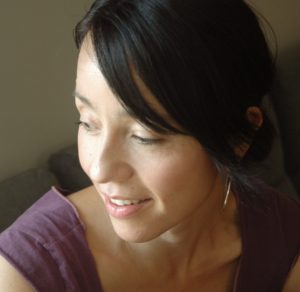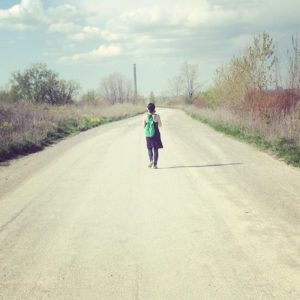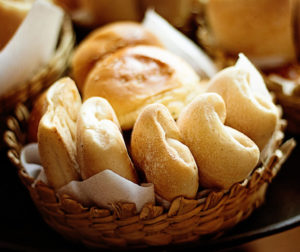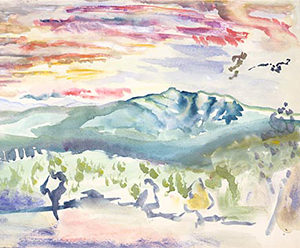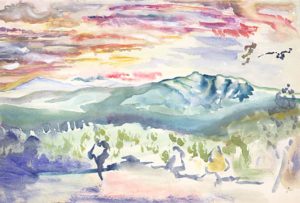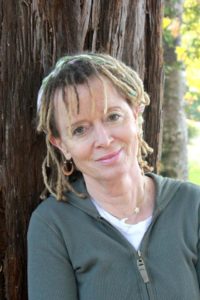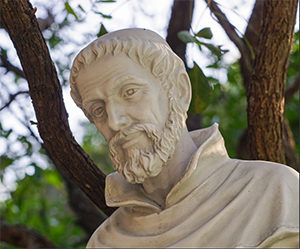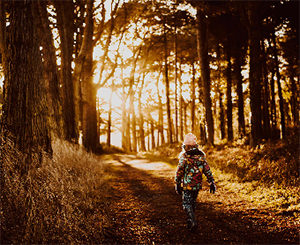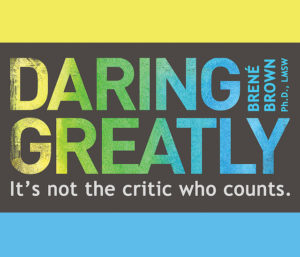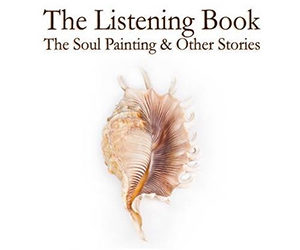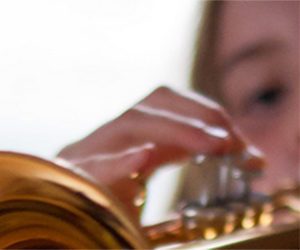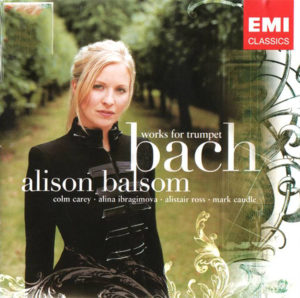Every Child
by Hafiz
(translated by Daniel Ladinsky)
Every child has known God,
Not the God of names,
Not the God of don’ts,
Not the God who ever does Anything weird,
But the God who knows only four words,
And keeps repeating them, saying:
“Come dance with Me, come dance.”
Birds Art Life by Kyo Maclear
(Doubleday Canada, 2017)
Reviewed by Laura Locke
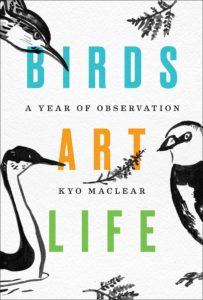 Don’t you love it when a book brings you to a standstill in the middle of a paragraph? When it causes you to say a quiet “wow” as you re-read a line?
Don’t you love it when a book brings you to a standstill in the middle of a paragraph? When it causes you to say a quiet “wow” as you re-read a line?
Birds Art Life (2017) by Kyo Maclear was such a book for me. Maclear is a Canadian novelist – The Letter Opener (2007) and Stray Love (2012) – who has also written five much-loved children’s books. One recent winter she found herself “at a loss for words”. Her father, the award-winning journalist and documentary filmmaker Michael Maclear, had suffered two recent strokes, when an MRI revealed an unruptured cerebral aneurysm. In helping to care for him, and as a busy wife and mother of two boys, she struggled with fretfulness, weariness, grief, and an inability to get on with her writing work. She writes, “…I found myself with a broken part. I didn’t know what it was that was broken, only that whatever widget had previously kept me on plan, running fluidly along, no longer worked as it should.”
Maclear decided she needed to fall in love with something bigger than herself, something that would, in her words, “hold me and my wandering mind.” One night she and her singer/composer husband watched the rough cut of a documentary film he was scoring. Entitled 15 Reasons to Live, the film tackled the question through fifteen stories that explored what makes life worth living. One story featured a thirty-something musician, wallowing in creative depression, who took up urban bird-watching in the city of Toronto…and found it helped him feel “easy-hearted”. Maclear was intrigued.
She was further intrigued by the musician’s website, with its extensive and slightly odd collection of his bird photos. They were definitely not like the photos you might find on a glossy bird calendar, and showed a love for the struggling and imperfect. Maclear was emboldened to contact him, and asked to accompany him on a “bird walk”. Birds Art Life is a memoir of sorts about the year of friendship and bird-watching that follows. But it’s also much more than that.
Maclear seamlessly weaves stories and reflections on her own life into her discoveries about bird life and bird-watching. The book is also filled with captivating quotes from famous authors, artists and others, many which I found myself jotting down in my own journal – such as this one by Pete Seeger: “I think the world is going to be saved by millions of small things. Too many things can go wrong when they get big.”
As well, we are treated, page after page, to interesting photos and Maclear’s sweetly quirky drawings of everything from birds to shoes to chairs to eyebrows.
The resulting delightful cocktail is always deeply honest, often profound, and frequently very touching. She ruminates on her childhood as the daughter of two immigrants to Canada (a Japanese mother and British father), her marriage, her children, her work as a writer, her personality, her gifts and her limitations. She touches on themes such as smallness, regrets, freedom, aging, art, insecurities, endings, and beginnings – and many of her insights flow out of patiently waiting for and watching birds with her new friend/bird-watching guide.
One also can’t help but be impressed by the clarity of Maclear’s writing. I found myself earmarking page after page of her book, and often reading sections aloud, to myself or to anyone within hearing range. For example, near the end of the book Maclear lists some of the lessons she learned from her year of bird-watching, each one like a dew-drop of wisdom. Here’s a taste: “There are no big reasons to live. Just little reasons.” … “Birding is more than an activity. It’s a disposition. Keep your eyes and ears and mind open to beauty. Look for birds in unprecious places, beside fast-food restaurants and in mall parking lots.”… “Never carry more than you need.” … “Just a nice stroll through a park is enough. Walk everywhere in the city and you will find you don’t need to traipse up Everest or schlep to Kalamazoo to go places.”
Maclear’s enchanting book meanders like a stimulating and soul-nourishing conversation with a good friend, and is a reminder to all of us to tread lightly, keep watch, and celebrate the “small and significant”.
Visit www.kyomaclear.com
Les Boulangers
Blessed be the breadmakers of la belle France
who rise before dawn to plunge their arms
into great tubs of dough. Blessed be the yeast
and its amazing redoubling. Praise the nimble
tongues of those who gave names to this plenty:
baguette, boule, brioche, ficelle, pain de campagne.
Praise the company they keep, their fancier cousins:
croissant, mille feuille, chausson aux pommes.
Praise flake after golden flake. Bless their saintly
counterparts: Jésuit, religieuse, sacristain, pets de nonne.
Praise be to the grain, and the men who grew it. Bless
the rising up, and the punching down. The great
elasticity. The crust and the crumb. Bless
the butter sighing as it melts in the heat.
The smear of confiture that gilds the plane.
And bless us, too, O my brothers,
for we have sinned, and we are truly hungry.
Used by permission of the author, from her new book Les Fauves (C&R Press, 2017)
i thank You God for most this amazing
i thank You God for most this amazing
day: for the leaping greenly spirits of trees
and a blue true dream of sky; and for everything
which is natural which is infinite which is yes
(i who have died am alive again today,
and this is the sun’s birthday; this is the birth
day of life and of love and wings: and of the gay
great happening illimitably earth)
how should tasting touching hearing seeing
breathing any–lifted from the no
of all nothing–human merely being
doubt unimaginable You?
(now the ears of my ears awake and
now the eyes of my eyes are opened)
This poem is in the public domain.
e.e. cummings reading his poem:
Hallelujah Anyway: Rediscovering Mercy by Anne Lamott
Riverhead Books; 2017
Review by Laura Locke
I first discovered Anne Lamott’s writing quite a few years back, when I came across her 1999 book Traveling Mercies: Some Thoughts on Faith. Reading her book freed me up to admit that faith doesn’t always give us easy answers and happy endings. She helped me understand that the gift of a writer is honesty – shedding light on the truth of ordinary living, exposing the moments we all share of awkwardness, humiliation, distress, hope, love and unexpected joy. Her writing makes me laugh – out loud.
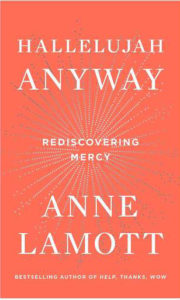 I have thoroughly enjoyed many of her books written since 1999, and even the ones written before, which I have been happily discovering at the library. This spring brings the publication of her latest offering, Hallelujah Anyways: Rediscovering Mercy. Hallelujah, indeed.
I have thoroughly enjoyed many of her books written since 1999, and even the ones written before, which I have been happily discovering at the library. This spring brings the publication of her latest offering, Hallelujah Anyways: Rediscovering Mercy. Hallelujah, indeed.
This slim book is a meditation on the importance of extending and receiving mercy, which Lamott defines as “radical kindness”. Drawing, as usual, from the culture around us, as well as ruthlessly exploring her own life experiences and inner landscape, Lamott also delves quite extensively into Scripture. In fact, she travels along a number of “walkways to awakening”.
Each chapter is like a new reflection from a Mercy Workshop (the title of the first chapter). A chapter called “Life Cycles” takes us on the journey we all make, from cute amazing baby to wobbly unlovely senior. It’s a beautiful, haunting rendition of how our lives start out so bright and open, and then – drawing on her own experiences – get damaged and narrowed and hardened.
Another chapter focuses on the importance of friendships as a way to practice giving and receiving mercy. It includes this radiant passage:
“I’ve lived through times when a connected group of humans in grief and shock stayed together as things unscrolled, when a person was dying too young, or after. What could we do? We showed up. When our best friends’ teenagers disappeared, when their fathers lost their minds, or their babies or mates were in the ICU. We lay beside them in bed and held them in our arms. We brought the bereaved a sandwich. We let them vent, maybe watched a little TV together. We offered our presence, our warm bodies, and the willingness to feel like shit with them. One even bigger gift: no snappy answers. We could nod, sigh, cry with them; maybe go to a park. Against all odds, these things work, however imperfectly, when a closed system breaks open and turmoil ensues: this collective, imperfect, hesitant help is another kind of miracle.”
Being a collector of quotes and poetry, I’m happy that her book includes many lovely little bits of both. I also appreciate how she often unpacks and comments on them. For instance, she offers this quote from Rainer Maria Rilke’s poem I am Much Too Alone in This World, Yet Not Alone: “I want to unfold. I don’t want to stay folded anywhere, because where I am folded, there I am a lie.”
Lamott comments: “We got folded by trying as hard as we could to make everyone happy, to please everyone, and to fill every moment with productivity. Our grown-ups said this would bring approval, and approval would bring satisfaction, and they would like us more.”
Or this quote from Krishnamurti, the great Indian teacher, who when asked what was the secret to his serenity, said, “I don’t mind what happens”– to which Lamott makes this lovable observation: “This is so not me – I mind his having even said this. I want to change, but it hurts; waking up is miserable, and transformation is terrifying.”
Lamott knows about weakness and limitations and failure, and insists that they don’t need to hold us back from doing good things. In one very moving part of the book she tells the story of how she made a “snarky” comment in haste on Twitter that brought “disgrace” upon her and her family. And then she relates how humility and asking forgiveness and being open to mercy from others helped her breathe again.
Her re-telling of stories from Scripture are packed with nuanced wisdom, as she looks at the parables of the Prodigal Son and the Good Samaritan, and other narratives such as Jonah; Mary, Martha and Lazarus; Naomi and Ruth; and Joseph and his brothers. In one chapter, Lamott discusses the story of Jesus and the Samaritan woman at the well, who was excluded from her community because of her ‘reputation’:
“Jesus said to the woman at the well, “Be like me: be true to who you really are; be in truth; share; and above all, try to forgive.” This is such bad news for those of us who would like to even the score at some point. On bad days we can still feel, “All my enemies are drowning and it’s the best day of my life.” Jesus says, “That’s fine, honey, nice try; I still love you, but maybe you would consider restarting the forgiveness stuff? Maybe you might practice inclusion?”
Lamott’s candour-filled writing has a powerful way of showing us that we don’t need to be incredibly spiritual, or be in an extraordinary setting, to “experience transcendence and God and restoration, and the inclination to serve those who are suffering.” We just need to be awake. As she insightfully puts it:
“This all looks so ordinary that you might miss it. It’s so daily. You don’t need special music and a Hollywood production and the Mormon Tabernacle Choir. You don’t need the Canadian fjords, the Grand Canyon, a newborn baby, although these can be helpful. You don’t need to go to Senegal. Immediacy and inspiration can be found in the dairy aisle at Safeway. It probably looks like people saying hello, making eye contact, letting others go first. Ordinary human daily ways, but moving more slowly.”
In a recent interview published in RealSimple magazine, Lamott was asked what she’d like her readers to take away from her new book. She replied, “That there is hope. That to be instruments of mercy fills us up. And that sharing love and passion heals us, and gives our lives cohesion, direction, and meaning.”
For me, Hallelujah Anyway was itself an instrument of mercy, and like a long drink of fresh water, it filled me up.
To a Statue of St. Francis
Your focused, caring, interested eyes
caught me as I walked across the grass.
I even reached out to put my fingers
on your open, extended hand –
who would have thought that
grey steel could look so real?
You are the one who talked with the wolf,
who walked thousands of miles in bare feet
to dialogue with the Sultan,
to embrace the leper,
who took down every barrier encountered.
You were made of the same enspirited flesh as I,
but you opened wide to the transfiguring Spirit of Love
–your shaven head and gaunt frame,
your coarse robe and unshod feet
belie nothing held back—
and the marks of the stigmata on your wrists
reveal a oneing of your heart with Christ’s.
Standing in your gentle gaze, your canticle to creation
unfolding all around through birdsong and spring blossom,
you make me realize what God can do
with a simple, humble heart ready to serve.
Looking at you opens my heart a little wider
and puts on my tongue the words:
Use me, Lord; send me in the one Spirit
as you did Francis
to be a troubadour of your love.
Go To The Limits Of Your Longing
God speaks to each of us as he makes us,
Then walks with us silently out of the night.
These are words we dimly hear:
You, sent out beyond your recall,
Go to the limits of your longing.
Embody me.
Flare up like flame
And make big shadows I can move in.
Let everything happen to you: beauty and terror.
Just keep going. No feeling is final.
Don’t let yourself lose me.
Nearby is the country they call life.
You will know it by its seriousness.
Give me your hand.
From Rainer Maria Rilke’s “Book of Hours”
Translated by Joanna Macy
Daring Greatly: How the Courage to Be Vulnerable Transforms the Way We Live, Love, Parent, and Lead by Brené Brown
Avery Publishing, Penguin Group; 2012
Review by Cherie Tetz-Christensen
Brené Brown is an American scholar, author, and public speaker, who is currently a research professor at the University of Houston Graduate College of Social Work. Over the last fifteen years she has been involved in research on a range of topics, including vulnerability, courage, shame, and empathy. Her TEDTalks “The Power of Vulnerability” and “Listening to Shame” have been viewed over 6 million times. Brown’s book “Daring Greatly” was a #1 New York Times Bestseller.
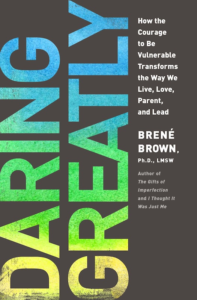 This beautiful book borrows from Brené Brown’s extensive research on vulnerability and shame, and her own personal experiences in ways that are profound, candid, and engaging. Daring Greatly is all about the terror and the gifts of vulnerability. Brown’s therapist called it an “exquisite” emotion. Brown prefers the term “excrutiating” – or in her words (and mine): “I frickin’ hate vulnerability!” Every cell in my body resists going there, and yet…
This beautiful book borrows from Brené Brown’s extensive research on vulnerability and shame, and her own personal experiences in ways that are profound, candid, and engaging. Daring Greatly is all about the terror and the gifts of vulnerability. Brown’s therapist called it an “exquisite” emotion. Brown prefers the term “excrutiating” – or in her words (and mine): “I frickin’ hate vulnerability!” Every cell in my body resists going there, and yet…
I discovered many years ago through Spiritual Direction that vulnerability (living honestly with myself, with another, and with God) would be the path of a forever and continuous healing. What a gift it was for me to experience a compassionate, non-judging presence in those moments where I risked “showing up and being seen.” This terrifying invitation to live in an undefended way continues to open me up to a life of more authenticity, wholeness, creativity, and genuine connectedness.
But, in all honesty, I feel scared to death every time I risk it! Every time I take the risk of showing up, just as I am – the lovely and the unlovely me – I notice how frightened I am of looking weak, of asking for help, of being seen as “less than.” As illogical as this is, I’m afraid of being left alone. I’ve discovered deep roots of shame that work hard to stay hidden in the dark.
In Daring Greatly, Brown explores what drives our fear of being vulnerable, how we protect ourselves from it, and the price we pay when we shut down and disengage. Her research on shame explores some of the ways we feel “not enough”, and how this scarcity keeps us from taking the risk of being exposed. She highlights the myths of vulnerability, and goes on to discuss the importance of living our lives wholeheartedly – and what that looks like.
One of the myths of vulnerability that Brown talks about in Daring Greatly is this: “I don’t do vulnerability.” You, like me, might think that as well. You, like me, may have found a zillion ways to protect yourself, and defend against and medicate your uncomfortable and vulnerable feelings. You, like me, might be surprised to learn that despite these efforts, vulnerability drives more of your responses to life than you ever knew! We all do vulnerability! What if noticing these vulnerable moments is the place of invitation? The place where, if I have the courage to show you who and how I really am, I might discover that I am loved. Yes, it’s risky…but, oh, the possibilities!
 It takes courage (again and again and again) to embrace this way of vulnerability. But Brown points out that vulnerability and courage are contagious. Finding people and creating communities where “I can dare to show up, live my uncertainties and take emotional risks” is the only path to feeling connected to our own true essence and creativity – and also feeling connected to the important people and work in our lives. We need one another!
It takes courage (again and again and again) to embrace this way of vulnerability. But Brown points out that vulnerability and courage are contagious. Finding people and creating communities where “I can dare to show up, live my uncertainties and take emotional risks” is the only path to feeling connected to our own true essence and creativity – and also feeling connected to the important people and work in our lives. We need one another!
Another myth of vulnerability that Brown discusses is an idea that shook me to the core: “Until we are receiving with an open heart, we are never really giving with an open heart.” Ouch! I realized some time ago that I’m okay with you not being perfect – but it’s very hard for me to be okay with me not being perfect! It is incredibly humbling to remember that whatever I judge in myself, I am also judging in “the other.” We honestly can’t do this work alone, and therefore I’m not allowed to just be the “one who helps”. I must also be the one who “asks for help.”
I am deeply grateful to have been leaning into these conversations, sometimes with a reluctant vulnerability, in Spiritual Direction and with my Soulstream community, long before I came across Brown’s book. In reading Daring Greatly, it was exciting to hear her saying the same profoundly simple and spiritual truths in a language that appeals to a wide audience.
I love this book and, because we never “arrive”; I know it will be one that I will read and share, again and again. I hope you join me in the conversation.
Cherie Tetz-Christensen will be facilitating a “Book Conversation” about Daring Greatly at Calgary’s FCJ Retreat and Conference Centre, starting Tuesday, March 7, 2017 at 6:30 to 8;30 pm, and continuing for six Tuesday evenings. Visit their website for more information or to register.
To contact Cherie, email her at Cherie.tetz@gmail.com or phone 587-439-8674
The Listening Books by James Webb
The Listening Book: The Soul Painting & Other Stories
The Second Listening Book: Loaded Questions & Other Stories
By James Webb
Published by Lioness Writing Ltd., U.K.
Review by Dr. Jenny Oliver
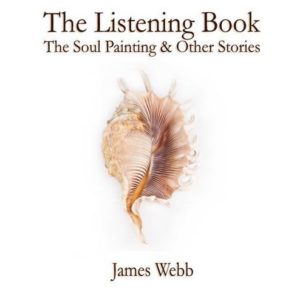 Reading the stories in the Listening Books is a little like snacking – you get a lot of ‘flavour’ in small bites. Similarly, reading one can leave you wanting the next, and the next.
Reading the stories in the Listening Books is a little like snacking – you get a lot of ‘flavour’ in small bites. Similarly, reading one can leave you wanting the next, and the next.
Some of the stories are very short, but all are thought-provoking. The style can vary. Narrow Road, in the Second Book, for example, might be described as destined for a teenage audience although the content is applicable to any age. Others might be reminiscent of Aesop’s Fables. The first story in the Second Book, Loaded Question, features a squirrel, and is highly amusing.
Teaching through storytelling is an ancient technique. Indeed, our Lord regularly taught by this method. We are privileged in the Gospels to hear the explanation of many of the tales, better known as Parables, but occasionally we read one whose message is perhaps a little unclear or disconcerting. Such are a few of James Webb’s tales, for me at any rate; for example Be Careful What You Wish For. It left me with the question, ‘Is this as straightforward as it seems?’
I found the brief tale, Of Myself and Others, particularly poignant. It reminded me of the words of Aslan in C.S.Lewis’ Narnia book, The Horse and His Boy: “Child,” said the Lion, “I am telling you your story, not hers. No one is told any story but their own.”
In turn, I was reminded of the words of Christ as recorded in the Gospel of John: “When Peter saw him, he said to Jesus, ‘Lord, what about this man?’ Jesus said to him, ‘If it is my will that he remain until I come, what is that to you? You follow me!’” (John 21:18-22).
In a related vein, Rufus and the Troll in the first book has an interesting take on self-perception and the beliefs of others. A sheep is still a sheep, even if he lives under a bridge and threatens to (but doesn’t) eat people.
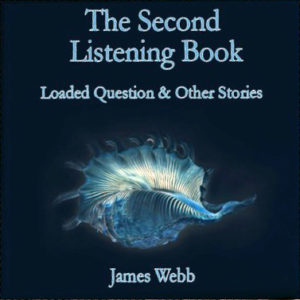 Webb is from the evangelical non-conformist tradition, although he has been a guest speaker in many denominations. He has had a variety of learning experiences, including his time as a Baptist minister in the UK and several roles in the Cornerstone Community, a mission and discipleship community in Australia.
Webb is from the evangelical non-conformist tradition, although he has been a guest speaker in many denominations. He has had a variety of learning experiences, including his time as a Baptist minister in the UK and several roles in the Cornerstone Community, a mission and discipleship community in Australia.
Webb grew up in Northamptonshire where his dad worked in Formula One motorsport (not as a driver), and his mum was a medical receptionist, when she wasn’t looking after her two sons. Webb and his wife Ruth, who grew up on the mission field with a father who served as a pilot with Mission Aviation Fellowship, have five children and are currently living in Canterbury, UK. While they were in Australia, Webb’s last role was as Dean of the Canowindra campus, which is one of the Cornerstone training colleges. He was involved as course coordinator, lecturing trainees, and mentoring. After a fruitful but challenging eight years in Australia, they decided that the time was right to return to the UK. This had always been in their vision, and in December 2014 they found themselves back in England, settling in Canterbury. Ruth, a primary (grade school) teacher, was quickly offered employment and James became a ‘house-husband’.
As might be imagined, five children from toddler to teen took up a lot of time. However, Webb returned to – or continued – his writing; something he has long enjoyed, even in his school years. The family regularly worships at Barton Church (FIEC), in Canterbury, where Webb occasionally preaches. A member of the congregation was looking to branch out into publishing, and thus The Listening Book: The Soul Painting and Other Stories was born. The book consisted of material from Webb’s popular blog, which he has been writing for a number of years, along with other original writings. The Second Listening Book was written in 2016, and published the same year.
For more information about James Webb, to read his blog, and to find out how to order The Listening Books, visit his website and follow him on Facebook.
Photos courtesy of James Webb.
Works for Trumpet
We are listening to Alison Balsom
play Bach. “Do we have to
listen to this?” Amber, eleven,
buckled up in the passenger seat,
balks, bucks. We’re late for school –
her backpack, lunchbox, and violin
ride mutely in the back. She looks
down at the CD box, makes a face:
“Who is Botch, anyway?”
Her violin leaps violently to the floor
as I brake for a stopped school bus.
“It’s not Botch,” I tell her. “It’s Bach –
only the greatest musician who ever lived,
that’s who.” She gives the box a second,
closer look – “Bach is pretty. How old is Bach?” –
frowning at the photo of Alison Balsom
on the cover. “That’s not Bach,” I tell her.
“It’s Alison Balsom. On trumpet. And yes,
she is pretty.” Amber raises her left eyebrow,
then stitches it to its twin. “A girl
playing the trumpet?” And I can hear
the wheels turning, tuning, inside her head
as the school bus trundles dumbly along
and we follow close behind. “There aren’t
any girls who play trumpet in my school.
Only boys.” And Alison belts out another
string of impossibly gorgeous arpeggios.
And Amber looks out the window, scratches
her head. She is listening. I don’t say
a word, pull in behind the school bus, park,
and we sit there for a long time, the violin
on the floor, the trumpet in the air, Alison
Balsom breathing Bach, breathing beauty,
Amber late for school and listening hard.
From “The Bad Guys” (FutureCycle Press, 2015)
Used here with the author’s permission.
And if you’ve never heard Alison Balsom play Bach on trumpet, give a listen:




